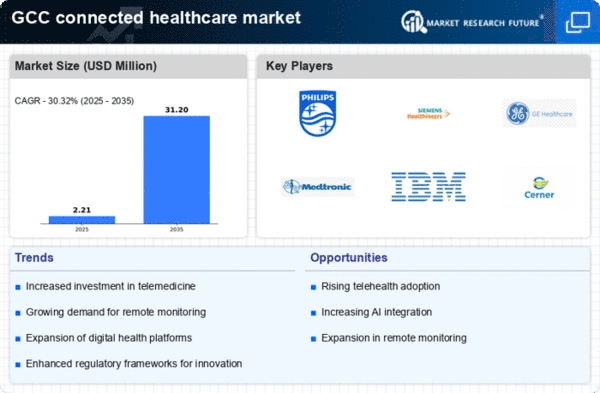Growing Focus on Patient-Centric Care
The connected healthcare market is increasingly shifting towards patient-centric care models, emphasizing the importance of patient engagement and satisfaction. This trend is driven by a growing awareness among patients regarding their health and wellness, leading to a demand for more personalized healthcare solutions. Healthcare providers in the GCC are adopting technologies that empower patients to take an active role in their health management, such as mobile health applications and telehealth services. This shift is likely to enhance patient satisfaction and adherence to treatment plans, ultimately improving health outcomes and reducing healthcare costs.
Government Initiatives and Investments
Government initiatives and investments play a crucial role in shaping the connected healthcare market in the GCC. Various governments are actively promoting digital health strategies to enhance healthcare accessibility and quality. For example, the UAE government has launched initiatives aimed at digitizing health records and promoting telehealth services. Such investments are expected to reach $2 billion by 2026, reflecting a strong commitment to advancing healthcare technology. These initiatives not only facilitate the adoption of connected healthcare solutions but also encourage private sector participation, fostering innovation and competition within the market.
Rising Demand for Remote Patient Monitoring
The connected healthcare market is experiencing a notable surge in demand for remote patient monitoring solutions. This trend is driven by the increasing prevalence of chronic diseases in the GCC region, which necessitates continuous health monitoring. According to recent data, approximately 30% of the population in GCC countries suffers from chronic conditions, leading to a heightened need for effective management strategies. Remote monitoring technologies enable healthcare providers to track patients' health metrics in real-time, thereby improving patient outcomes and reducing hospital visits. The connected healthcare market is likely to expand as healthcare systems increasingly adopt these technologies to enhance patient care and operational efficiency.
Advancements in Health Data Interoperability
Advancements in health data interoperability are significantly impacting the connected healthcare market. The ability to seamlessly share and access patient data across different healthcare systems is crucial for improving care coordination and patient outcomes. In the GCC, efforts are being made to establish standardized protocols for data exchange, which is expected to enhance the efficiency of healthcare delivery. As interoperability improves, healthcare providers can make more informed decisions based on comprehensive patient data, leading to better treatment outcomes. This trend is likely to drive the growth of the connected healthcare market as stakeholders recognize the value of integrated health information systems.
Integration of Artificial Intelligence in Healthcare
The integration of artificial intelligence (AI) into the connected healthcare market is transforming the way healthcare services are delivered in the GCC. AI technologies are being utilized for predictive analytics, personalized medicine, and operational efficiencies. For instance, AI can analyze vast amounts of patient data to identify trends and predict potential health issues, which can lead to timely interventions. The market for AI in healthcare is projected to grow at a CAGR of 40% in the coming years, indicating a robust interest in leveraging technology to improve healthcare delivery. This integration not only enhances diagnostic accuracy but also streamlines administrative processes, making healthcare more efficient.
















